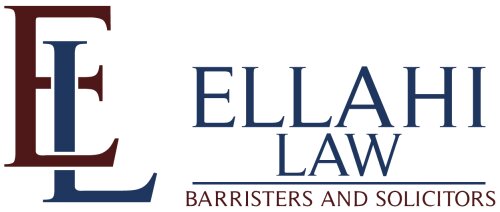Best Banking & Finance Lawyers in Toronto
Share your needs with us, get contacted by law firms.
Free. Takes 2 min.
List of the best lawyers in Toronto, Canada
About Banking & Finance Law in Toronto, Canada
Banking & Finance Law in Toronto, Canada governs the legal framework and regulations surrounding activities related to banking, lending, investments, and financial transactions. Toronto, as Canada's financial hub, is home to numerous banking institutions, investment firms, and regulatory bodies. Understanding the legal aspects of Banking & Finance is crucial for individuals and businesses involved in financial activities in Toronto.
Why You May Need a Lawyer
There are various situations where consulting a lawyer specializing in Banking & Finance Law in Toronto is advisable:
1. Starting a Bank or Financial Institution: If you plan to establish a bank or any financial institution in Toronto, you'll need legal assistance to navigate the complex licensing and regulatory requirements.
2. Obtaining Financing: Whether it's for personal needs or business ventures, a lawyer can guide you through the borrowing process, ensuring compliance with relevant laws while safeguarding your rights.
3. Investment and Securities: If you are involved in investments or securities trading, a lawyer can provide advice on compliance with securities laws, represent you in disputes, and ensure you understand the associated risks.
4. Financial Disputes: In cases of financial disputes, such as loan defaults, mortgage issues, or breach of contracts, a lawyer can help you protect your interests and advocate for a fair resolution.
5. Regulatory Compliance: Complying with the ever-changing banking and financial regulations can be challenging. A lawyer can ensure your business adheres to applicable laws, avoiding penalties and legal issues.
Local Laws Overview
In Toronto, Canada, several key aspects of local laws are particularly relevant to Banking & Finance:
1. Banking Law: The federal Bank Act governs the establishment, administration, and operations of banks and federally regulated financial institutions operating in Toronto.
2. Consumer Protection: Various federal and provincial laws provide consumer protection measures in banking and financial transactions, ensuring fair practices by financial institutions and protecting consumer rights.
3. Securities Regulation: Ontario Securities Commission administers and enforces securities laws in Toronto. It regulates the issuance, trading, and sale of securities to ensure market integrity and investor protection.
4. Privacy and Data Protection: In Toronto, laws like the Personal Information Protection and Electronic Documents Act (PIPEDA) safeguard individuals' personal information and establish rules for its collection, use, and disclosure by financial institutions.
Frequently Asked Questions
Q1: Can I sue a bank for unfair practices?
A1: Yes, if you believe a bank has engaged in unfair practices, you may have legal recourse. Consulting a Banking & Finance lawyer can help you understand your options and guide you through the process of filing a lawsuit.
Q2: What are the legal requirements for opening a bank account in Toronto?
A2: The legal requirements to open a bank account may vary depending on the type of account and financial institution. Generally, you will need valid identification, proof of address, and sometimes additional documents. It's advisable to directly contact the bank to understand their specific requirements.
Q3: What is the role of the Financial Consumer Agency of Canada (FCAC) in Toronto?
A3: The FCAC is a government agency responsible for protecting and educating consumers in the financial sector. They oversee compliance with consumer protection laws, provide information on financial products and services, and handle complaints against federally regulated financial institutions.
Q4: How can I protect my personal information when engaging with financial institutions?
A4: To protect your personal information, ensure you understand a financial institution's privacy policies. Limit the sharing of personal information, use secure channels for communication, employ strong passwords, regularly monitor your financial statements, and promptly report any suspicious activity to the institution and relevant authorities.
Q5: Can I negotiate the terms of a loan agreement in Toronto?
A5: In most cases, loan agreements are negotiable, especially for commercial loans. Consulting a Banking & Finance lawyer can help you review and negotiate terms to ensure they align with your needs and protect your interests.
Additional Resources
For further information and assistance, consider reaching out to these resources:
1. Financial Consumer Agency of Canada (FCAC) - Visit their website at fcac-acfc.gc.ca for information on consumer rights and responsibilities, financial education, and complaint resolution.
2. Ontario Securities Commission (OSC) - Access the OSC website at osc.gov.on.ca to find valuable resources and information on securities regulation, investor protection, and complaint filing.
3. Law Society of Ontario - The Law Society's website, lso.ca, provides a directory of lawyers specializing in Banking & Finance Law in Toronto. Use this resource to find reputable lawyers and verify their credentials.
Next Steps
If you require legal assistance or advice related to Banking & Finance in Toronto, follow these steps:
1. Evaluate Your Needs: Determine the specific issue or area where you require legal help, such as banking disputes, starting a financial institution, or investment regulations.
2. Research Lawyers: Look for lawyers or law firms specializing in Banking & Finance Law in Toronto. Consider their expertise, experience, and client reviews. Verify their licenses and credentials.
3. Consultation: Schedule consultations with a few lawyers to discuss your situation. Ask about their approach, fees, and potential outcomes. Choose a lawyer who demonstrates expertise and with whom you feel comfortable working.
4. Engagement and Collaboration: Once you have selected a lawyer, engage their services by signing a retainer agreement. Collaborate closely, providing all necessary information and documents required to build a strong case or resolve your legal issue.
Remember, the information provided here is general in nature and should not be considered a substitute for professional legal advice. Consulting a lawyer is crucial for obtaining accurate advice tailored to your specific circumstances.
Lawzana helps you find the best lawyers and law firms in Toronto through a curated and pre-screened list of qualified legal professionals. Our platform offers rankings and detailed profiles of attorneys and law firms, allowing you to compare based on practice areas, including Banking & Finance, experience, and client feedback.
Each profile includes a description of the firm's areas of practice, client reviews, team members and partners, year of establishment, spoken languages, office locations, contact information, social media presence, and any published articles or resources. Most firms on our platform speak English and are experienced in both local and international legal matters.
Get a quote from top-rated law firms in Toronto, Canada — quickly, securely, and without unnecessary hassle.
Disclaimer:
The information provided on this page is for general informational purposes only and does not constitute legal advice. While we strive to ensure the accuracy and relevance of the content, legal information may change over time, and interpretations of the law can vary. You should always consult with a qualified legal professional for advice specific to your situation.
We disclaim all liability for actions taken or not taken based on the content of this page. If you believe any information is incorrect or outdated, please contact us, and we will review and update it where appropriate.
Browse banking & finance law firms by service in Toronto, Canada
Toronto, Canada Attorneys in related practice areas.

















